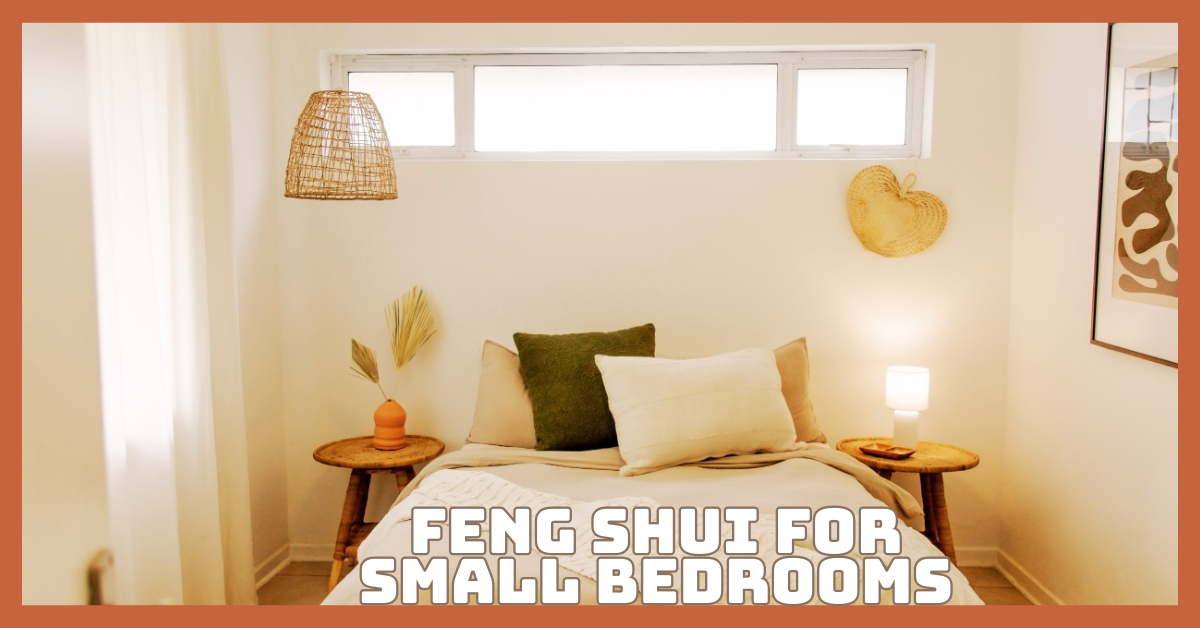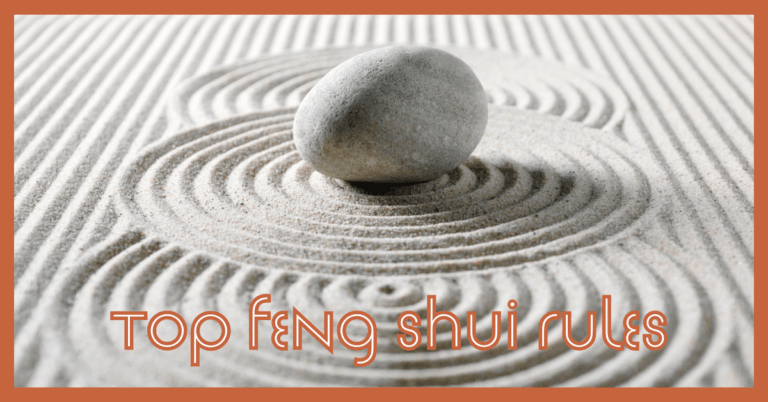Feng Shui for Small Bedrooms To Create A Calming Retreat
Feng Shui for small bedrooms provides practical techniques to maximize comfort, energy flow, and tranquillity in limited spaces.
This ancient Chinese art focuses on balancing energy to promote rest, relaxation, and positive vibes—even in tight spaces.
From strategic furniture placement to mindful colour choices, Feng Shui can transform your compact bedroom into a peaceful sanctuary.
This article will explore easy, practical Feng Shui tips explicitly tailored for small bedrooms to help you sleep better and feel more grounded.
Importance Of Feng Shui For Small Bedrooms
Feng Shui provides practical techniques to make the most of restricted space. However, creating a peaceful ambiance in a small bedroom can be challenging.
This ancient Chinese practice focuses on harmonizing energy, promoting relaxation, and supporting well-being. Below are key reasons why applying Feng Shui in small bedrooms is essential.
1. Promotes Better Sleep Quality
Feng Shui helps create a soothing sleep environment by arranging furniture mindfully and incorporating calming elements like soft fabrics and muted colours.
This reduces overstimulation and mental clutter, promoting deeper, uninterrupted rest. A supportive bed placement and balanced décor enhance relaxation and sleep quality in a small bedroom.
2. Maximizes Limited Space
In small bedrooms, Feng Shui encourages clearing clutter and using multifunctional furniture to free up floor space. It promotes minimalism and thoughtful organization, which creates a more open, breathable atmosphere.
With fewer distractions and more purposeful design, the room feels larger, calmer, and more aligned with restful energy.
3. Improves Energy Flow (Chi)
Proper Chi (energy) flow is essential in Feng Shui. This means avoiding blocked pathways, overcrowded furniture, and cramped corners in small bedrooms.
Good energy flow fosters relaxation and vitality. Arranging the bed with space on both sides and keeping under-bed areas clear allows energy to circulate more freely.
4. Reduces Stress And Anxiety
Stress builds in cluttered, chaotic spaces. Feng Shui uses symmetry, soothing textures, and natural elements to foster emotional balance.
In small bedrooms, where tension can feel amplified, a serene layout, balanced lighting, and calming colour palettes help reduce anxiety and bring a sense of order and emotional calm.
5. Supports Emotional Well-Being
A small, well-arranged bedroom nurtures emotional wellness by providing a safe, cozy environment. Feng Shui encourages personal touches, soft textures, and organized surroundings that foster a sense of comfort.
By eliminating visual noise and enhancing warmth, the space becomes a retreat where self-reflection, healing, and emotional grounding can thrive.
6. Boosts Relationship Harmony
Feng Shui principles suggest pairs and symmetry to enhance love and connection. In small bedrooms, balanced nightstands, equal partner space and romantic tones like pink or soft red cultivate harmony.
Even in tight quarters, intentional décor placement can support intimacy, communication, and emotional balance between couples.
7. Encourages Better Focus And Rest
A small bedroom can feel like a multipurpose room, but Feng Shui urges the separation of rest and work.
Removing electronics and avoiding desks near the bed helps eliminate distractions. This dedicated sleep space fosters mental clarity, supports better rest, and allows your mind to relax and recharge.
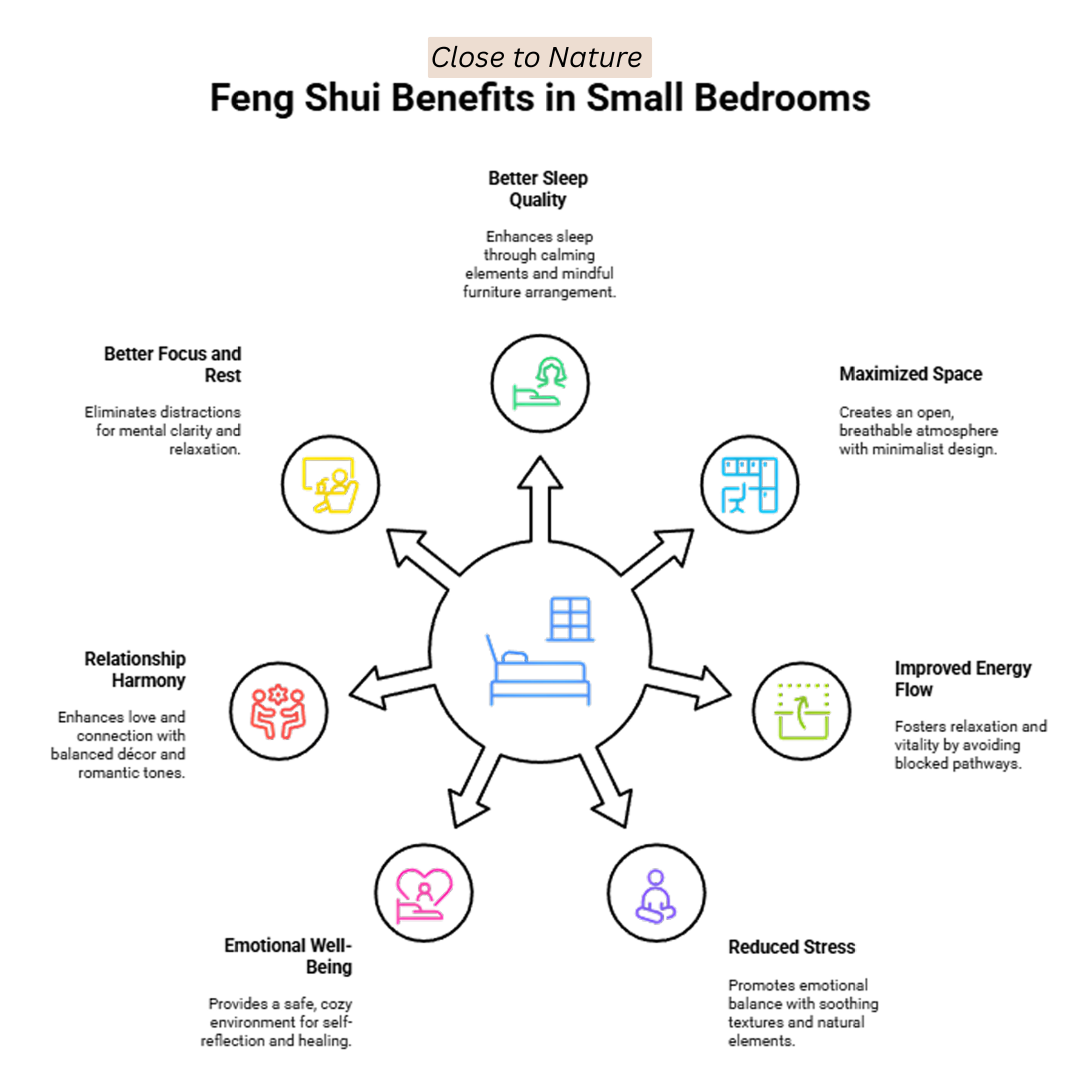
Feng Shui Tips For Small Bedrooms
Feng Shui for small bedrooms emphasizes optimizing layout and energy flow to create a restful, harmonious space despite limited square footage.
This ancient Chinese practice focuses on aligning your surroundings with positive energy (Chi) to support sleep, reduce stress, and maximize limited space.
Below are practical Feng Shui tips to help you transform your compact bedroom into a sanctuary.
1. Choose A Commanding Bed Position
In feng shui, the position is crucial because it influences how safe and supported you feel while resting.
Placing your bed in the “command position” means you can see the door without being directly in line with it, ideally diagonally across the room.
This placement gives you a subconscious sense of control and security, allowing you to relax more deeply. When your bed faces the door head-on, it can make you feel exposed or unsettled.
The event is to achieve this positioning in small bedrooms, help balance energy flow, nd transform the space into a calming, protective retreat.
2. Keep The Space Under Your Bed Clear
In Feng Shui, the space under your bed represents the foundation of your rest, so keeping it clear is essential for peaceful, uninterrupted sleep. When you store items beneath the bed, energy becomes stagnant and heavy.
This trapped energy can subconsciously weigh you down, leading to restless nights or anxious thoughts. If you need to use this space, only store soft, sleep-related items like extra bedding or pillows, and keep them neatly organized.
A clear, open area under the bed allows energy (Chi) to flow smoothly and supports a restful, rejuvenating environment.
3. Use Soft And Calming Colours
Colour plays a decisive role in setting the mood of your bedroom, especially in small spaces where every detail matters.
In Feng Shui, soft and calming colours like gentle blues, warm creams, pale greens, and earthy neutrals are ideal because they soothe the senses and promote emotional balance.
These tones help quiet the mind and reduce overstimulation, making relaxing and falling asleep easier. Light shades also reflect more natural light, giving the illusion of a more open, spacious room.
By surrounding yourself with peaceful colours, you invite serenity into your space and create a gentle, restorative environment perfect for rest.
4. Incorporate Natural Elements
Incorporating natural textures and materials is a core principle of Feng Shui for small bedrooms, helping to ground energy and promote a calming, restorative environment.
Wood, cotton, bamboo, and wool contain calming, nurturing energy that softens the room and supports emotional well-being.
A small wooden nightstand, cotton bedding, or a bamboo shade can subtly shift the space toward tranquillity.
Adding a few healthy plants also boosts oxygen and symbolizes growth, but keep them modest to avoid overwhelming the space.
When thoughtfully chosen, natural elements enhance the flow of positive Chi and make your bedroom feel peaceful, warm, and alive.
5. Avoid Mirrors Facing The Bed
In Feng Shui, mirrors are considered powerful tools that reflect and amplify energy, but when placed directly across from the bed, they can create more harm than harmony.
A mirror facing the bed bounces energy around the room, making it feel restless or chaotic, disturbing your sleep and leaving you feeling drained.
Mirrors can also reflect personal energy during rest, making it harder to relax or feel safe fully. If you love having a mirror, try positioning it on a side wall or behind a closet door, keeping it from directly facing your bed.
6. Balance Both Sides Of The Bed
Creating balance on both sides of the bed is a simple yet powerful Feng Shui technique that fosters relationship harmony.
Matching nightstands and lamps adds visual symmetry and symbolizes equality, support, and mutual respect between partners. Even if you’re single, this arrangement invites balanced energy and emotional stability into your life.
It helps prevent one-sided dynamics and promotes feeling supported on all levels—emotionally, mentally, and spiritually.
Choose compact or minimalist pieces in small bedrooms to maintain symmetry without crowding the space. This thoughtful setup nurtures connection, peace, and a sense of wholeness.
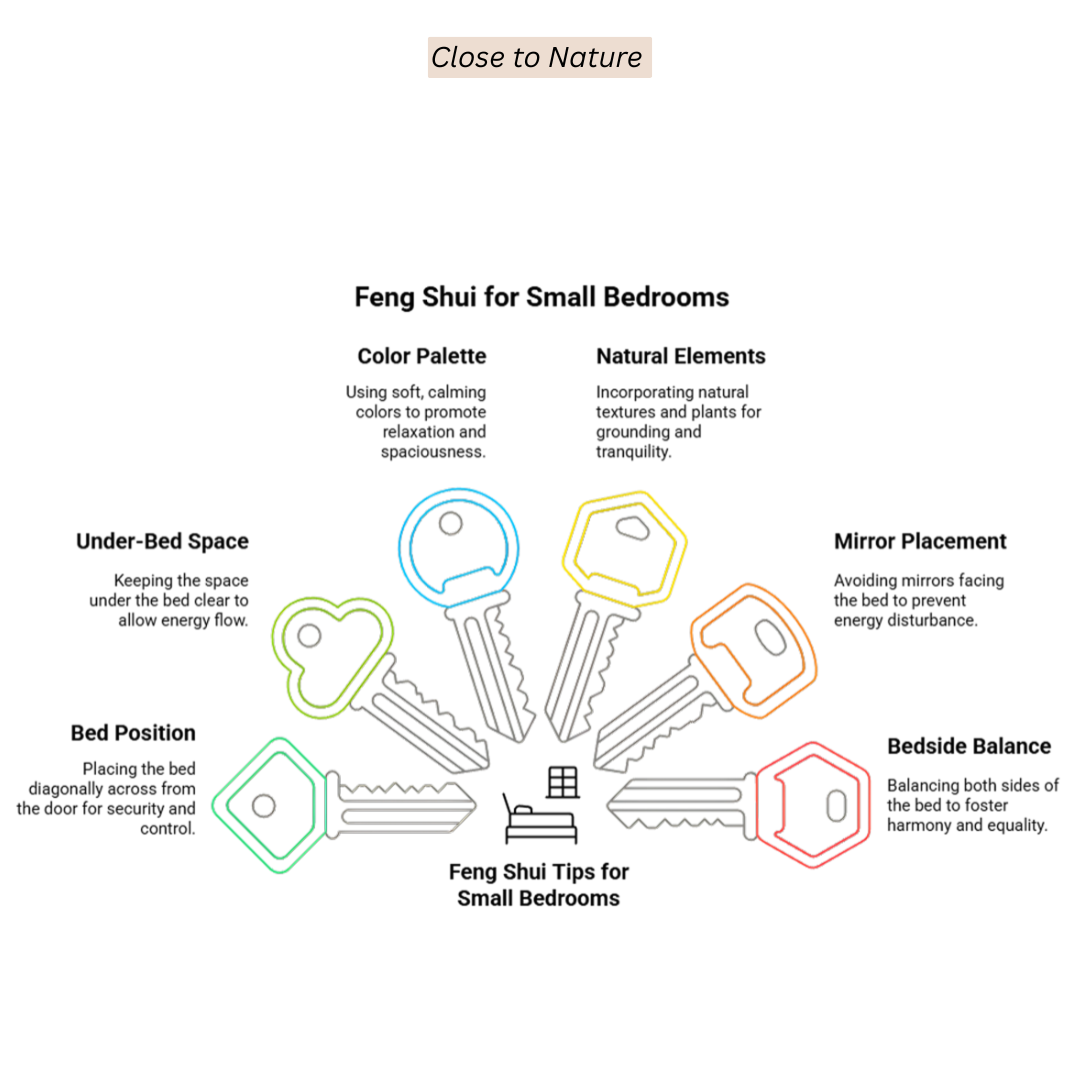
7. Minimize Electronics
Feng Shui for small bedrooms recommends minimizing electronics to preserve a peaceful energy flow and support restful sleep.
Phones, TVs, and computers emit electromagnetic fields (EMFS) that can interfere with sleep, increase stress, and disrupt your sense of calm. Free from distractions that overstimulate the body or mind, the bedroom should be a haven for relaxation.
By keeping electronics out of reach or away from the bed, you create a peaceful environment conducive to deep, restorative sleep. Use the bedroom for relaxation only, allowing your mind and body to unwind and recharge overnight.
8. Use Soothing Lighting
Your bedroom's lighting greatly influences its ambiance; according to Feng Shui, restful sleep is encouraged by gentle, layered illumination.
Instead of harsh overhead lights, opt for table lamps, wall sconces, or dimmable bulbs that offer adjustable warmth and gentleness. These softer lights create a cozy, inviting atmosphere that encourages winding down at the end of the day.
Layering different light sources, such as bedside lamps with a dimmer and accent lighting, allows you to control the ambiance, making it easier to transition from daytime energy to the peaceful, restful energy needed for sleep.
9. Declutter Regularly
Feng Shui for small bedrooms emphasizes decluttering as essential for maintaining smooth energy flow and creating a serene, restful environment.
In Feng Shui, it’s believed that a cluttered space blocks the flow of energy, creating stress and restlessness. Keeping stands, dressers, and floors clear in small bedrooms is even more critical.
A tidy space promotes a peaceful environment and supports a clear, focused mind. When your bedroom is organized, it helps you mentally “unwind” and prepares your body for rest.
Regularly decluttering ensures that the energy in your space remains fresh, calm, and conducive to restorative sleep.
Create a Profitable Holistic Business That Transforms Lives
🌿 Discover inspiring holistic business ideas that blend nature, wellness, and purpose.
Learn how passionate nature lovers are building income streams while helping others live more balanced, mindful lives.
Read Profitable Holistic Business Ideas That Transform Lives
10. Limit Sharp Corners
Sharp corners on furniture, known in Feng Shui as “sha chi,” create harsh, disruptive energy that can affect the calm flow of your bedroom.
These sharp angles can make the space tense or unsettling, which may interfere with your ability to relax or sleep deeply.
Opt for furniture with rounded edges, particularly for pieces near your bed, such as nightstands or dressers, to soften the energy.
Rounded shapes promote a gentle, harmonious energy flow and create a soothing environment. This simple adjustment makes your room feel safer and more inviting, enhancing overall well-being and restful sleep.
11. Use Artwork Thoughtfully
Artwork has a powerful impact on the energy of a space, especially in the bedroom, where it influences your emotional state and rest.
In Feng Shui, choosing pieces that evoke positive emotions, such as serene landscapes, calming nature scenes, or imagery that promotes love and connection, is essential. These pieces help create a peaceful, uplifting atmosphere, supporting relaxation and emotional balance.
Avoid artwork with chaotic, harsh, or lonely themes, as they can create unsettling energy, leaving you feeling stressed or anxious. Thoughtful art selection can transform your bedroom into a tranquil haven, enhancing mood and sleep quality.
12. Create A Headboard Connection
Feng Shui for small bedrooms highlights the importance of a sturdy headboard to enhance stability, security, and supportive energy during rest.
A sturdy headboard symbolizes a solid foundation, offering physical and emotional security. Opt for one made of solid wood or upholstered fabric, as these materials bring grounding and warmth to the space.
Avoid instability by ensuring the headboard is securely fastened to the bed, which can lead to sleepless nights. This simple yet powerful Feng Shui adjustment helps promote restful sleep, enhances feelings of support, and ensures that your bedroom is a nurturing, balanced sanctuary.
13. Avoid Work-Related Items
In Feng Shui, keeping work materials like laptops, notebooks, and papers out of the bedroom to maintain a clear separation between rest and work energy is essential.
Mixing these energies can lead to stress and make it harder to unwind, affecting your sleep quality and overall well-being.
The bedroom should be a sanctuary dedicated to relaxation and rejuvenation. If space is limited and you must work in your bedroom, consider using a screen or curtain to create a clear division between your restful area and your work zone. This simple boundary helps preserve balance and tranquillity.
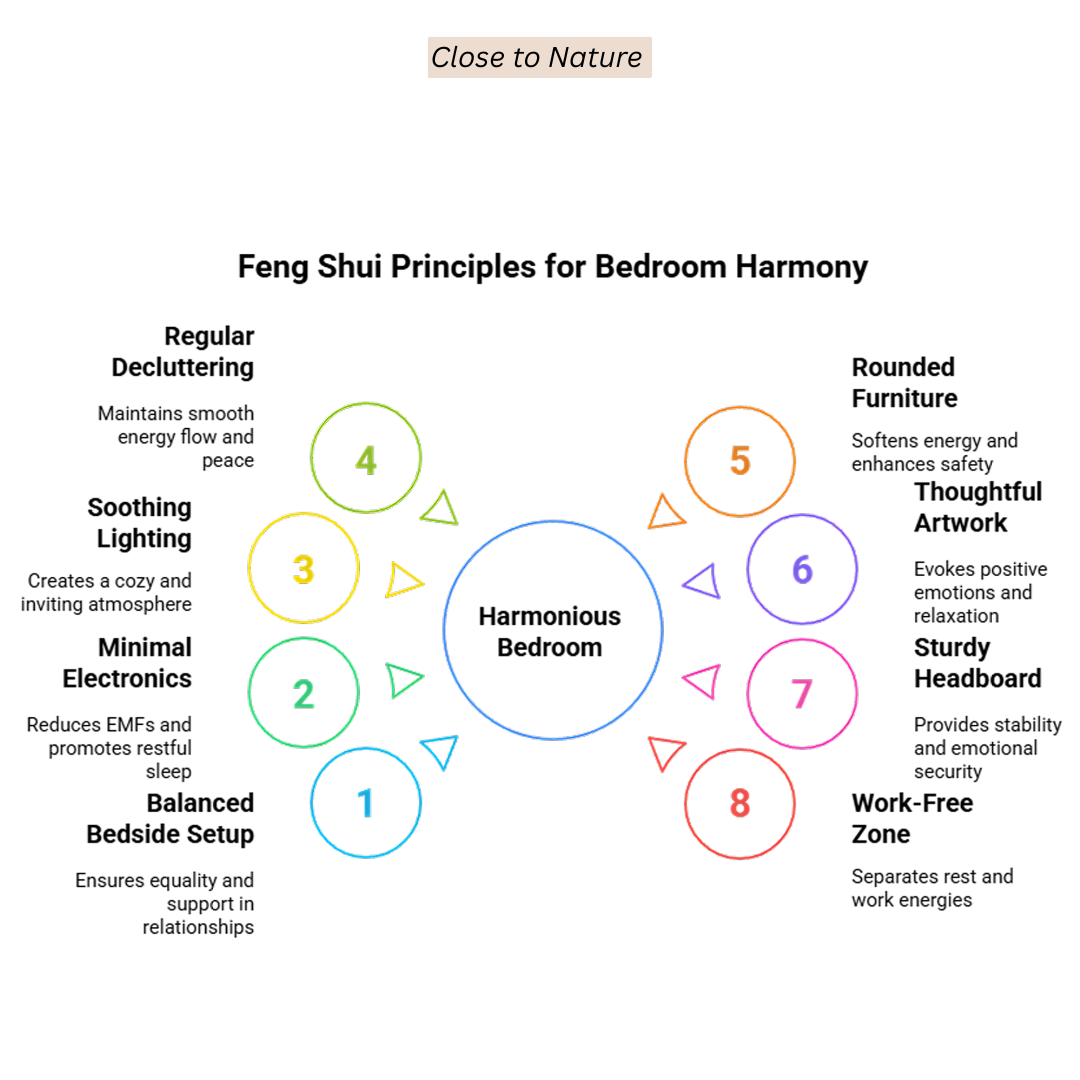
Common Feng Shui Mistakes To Avoid In Small Bedrooms
Even with the best intentions, it’s easy to make mistakes when applying Feng Shui principles, especially in small bedrooms with limited space.
These missteps can block energy flow, create stress, or reduce the room’s ability to support rest and balance. Below are common Feng Shui mistakes to avoid in small bedrooms and explanations of why they matter.
1. Placing The Bed Directly In Line With The Door
Mistake
Placing the bed directly in line with the door creates a sense of vulnerability, known as the “coffin position.” This disrupts the energy flow, making the space feel unsafe and unsettling, which impacts your ability to relax and sleep.
Why It's A Problem
This positioning increases anxiety and restlessness. You may feel exposed, which makes it difficult to sleep peacefully. It disrupts positive energy flow, leading to an uncomfortable environment that hinders relaxation and restful sleep.
2. Placing The Bed Under A Window
Mistake
The energy flow will be disrupted if you put your bed under a window. Windows are sources of external energy, and having your bed directly under one can leave you feeling vulnerable, reducing the restful energy needed for quality sleep.
Why It's A Problem
Windows can cause restless sleep as outside energy can flood the room, making it feel less protected. It prevents the bed from being supported by a solid wall, leading to an unstable feeling and hindering a restful environment.
3. Keeping Work Items In The Bedroom
Mistake
One important rule in feng shui for small bedrooms is to keep work items out, as they introduce stress and block the calming energy needed for restful sleep. The bedroom should be a space solely for relaxation, not work-related stress.
Why It's A Problem
Work energy in the bedroom can make it challenging to unwind. Work items interfere with relaxation, increasing stress and making it harder to sleep or relax, reducing the room’s peaceful, rejuvenating energy.
4. Neglecting Airflow And Ventilation
Mistake
Stale or poor airflow in the bedroom hinders positive energy circulation and creates an oppressive atmosphere. Feng Shui encourages good air quality and circulation to support health and balance in the space.
Why It's A Problem
Without fresh air, energy stagnates, leading to feelings of discomfort or irritability. Poor airflow can cause physical and mental fatigue, impacting sleep quality and well-being. Proper ventilation revitalizes the room and enhances energy flow.
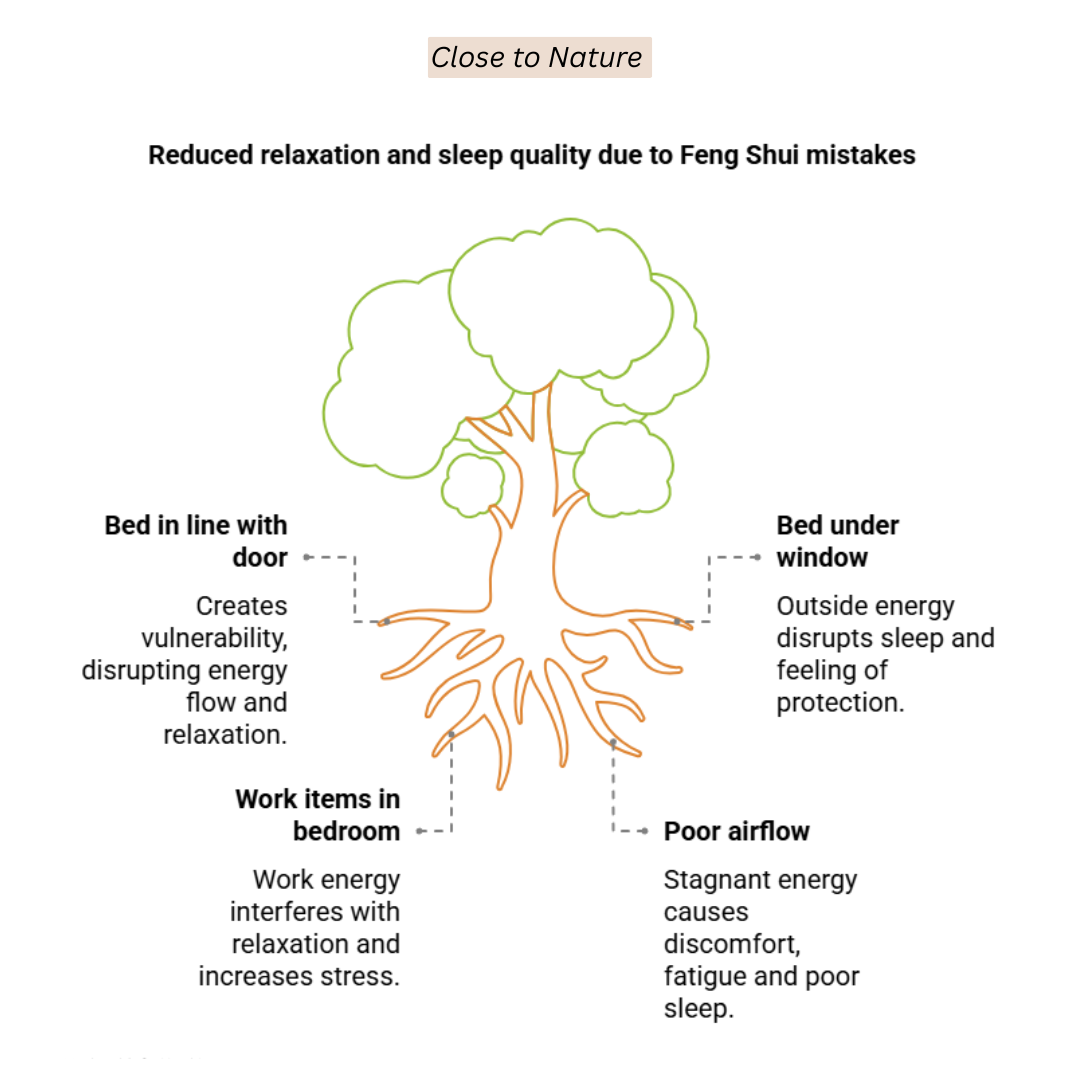
5. Having Too Many Personal Photos
Mistake
While personal photos can evoke warmth, having too many can overwhelm the space, especially in a small bedroom. Pictures of family members or past experiences can invoke emotional attachment, making it hard to unwind.
Why It's A Problem
Too many personal photos create an energetic pull that keeps the mind engaged, preventing relaxation. It can make the space feel too personal or emotional, hindering peaceful energy flow and restful sleep.
6. Overcrowding With Furniture
Mistake
In feng shui for small bedrooms, overcrowding with furniture hinders energy flow and makes the space feel chaotic rather than calm and restorative. Feng Shui encourages minimalism and strategic furniture placement for smooth energy circulation.
Why It's A Problem
Too much furniture blocks free energy movement and creates a sense of confinement, leading to stress and discomfort. A cluttered space feels suffocating and reduces the potential for calm, peaceful energy necessary for rest.
7. Using Excessive Black Or Metallic Accents
Mistake
While black and metallic accents can add sophistication, using them excessively in a small bedroom can create an imbalanced, harsh atmosphere. Feng Shui encourages using these colours in moderation for warmth and harmony.
Why It's A Problem
Excessive use of black or metallic elements creates an imbalanced environment that feels cold and uncomfortable. This effect intensifies in a small space, creating an atmosphere that can disrupt sleep and relaxation, preventing a restful, nurturing space.

Conclusion
Feng Shui for small bedrooms provides practical solutions to enhance energy flow, promote relaxation, and transform compact spaces into peaceful, nurturing environments.
By thoughtfully placing furniture, choosing soothing colours, and avoiding clutter or harsh lighting, even the tiniest room can feel open and restorative.
These mindful adjustments improve sleep and relaxation and promote harmony in daily life. With simple, intentional choices, your small bedroom can become a peaceful sanctuary that nurtures both body and spirit.
I trust you enjoyed this article on the Feng Shui for Small Bedrooms to Create A Calming Retreat. Please stay tuned for more inspiring guides, helpful tips, and ideas to help you live closer to nature every day.
Take care!
— JeannetteZ🌿
💬 Your Opinion Is Important To Me
Do you have thoughts, ideas, or questions? I’d love to hear from you. Please leave your comments below or email me directly at Jeannette@Close-To-Nature.org.
📚 More Nature-Inspired Reads
Explore more ways to connect with nature, nurture your pets, and live in harmony with the world around you 🌿

